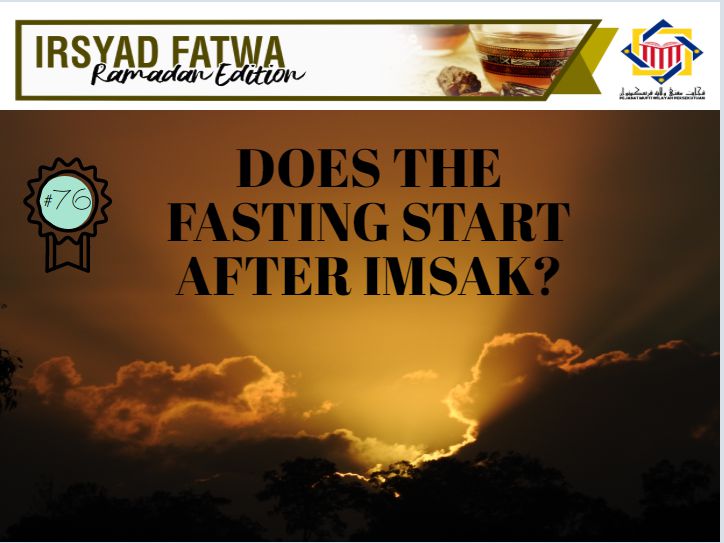
Question:
Assalamu‘alaikum SS Datuk Mufti. Generally, it is known that imsak is ten minutes before Subh. Does this means that we are not allowed to eat or drink after imsak because the fasting has already started?
Answer:
Waalaikumussalam wbt,
Alhamdulillah, praise and thanks to Allah for the countless blessings He has blessed us all with. Blessings and salutations to the Prophet Muhammad PBUH, his family, companions and all those that follow his teachings to the day of judgement.
Among the sunnah of fasting is to eat suhoor in the final time of it. As we all know, in Malaysia, the time for imsak is ten minutes before Subh. However, sometimes this caused confusion as to when does the fasting really begin. To discuss this issue, let’s study the following statement of Allah SWT:
وَكُلُواْ وَٱشۡرَبُواْ حَتَّىٰ يَتَبَيَّنَ لَكُمُ ٱلۡخَيۡطُ ٱلۡأَبۡيَضُ مِنَ ٱلۡخَيۡطِ ٱلۡأَسۡوَدِ مِنَ ٱلۡفَجۡرِۖ ثُمَّ أَتِمُّواْ ٱلصِّيَامَ إِلَى ٱلَّيۡلِۚ
“And eat and drink until the white thread of dawn becomes distinct to you from the black thread [of night]. Then complete the fast until the sunset.”
Surah al-Baqarah (187)
Al-Imam Ibn Kathir Rahimahullah stated in his commentaries that the above verse clearly specifies the time to stop eating suhoor, which is when the sun rises. [1]
There are several hadiths that describe the time of when the Prophet PBUH eat his suhoor:
تَسَحَّرْنَا مَعَ النَّبِيِّ صَلَّى اللهُ عَلَيْهِ وَسَلَّمَ، ثُمَّ قَامَ إِلَى الصَّلاَةِ، قُلْتُ: كَمْ كَانَ بَيْنَ الأَذَانِ وَالسَّحُورِ؟ قَالَ: قَدْرُ خَمْسِينَ آيَةً.
“Zaid bin Thabit said, "We took the "Suhur" (the meal taken before dawn while fasting is observed) with the Prophet (ﷺ) and then stood up for the (morning) prayer." I asked him how long the interval between the two (Suhur and prayer) was. He replied, 'The interval between the two was just sufficient to recite fifty to Sixth 'Ayat.”
Sahi al-Bukhari (1921) and Sunan al-Tirmizi (703)
Al-Hafiz Ibn Hajar al-‘Asqalani further explains that the recitation of fifty verses are in moderate pace of recitation. And the verses’ length is of moderate length, not of a lengthy or short verse. [2]
In another hadith, the Prophet PBUH said:
إِنَّ بِلاَلاً يُنَادِي بِلَيْلٍ، فَكُلُوا وَاشْرَبُوا حَتَّى يُنَادِيَ ابْنُ أُمِّ مَكْتُومٍ
“Bilal pronounces the Adhan at night, so keep on eating and drinking (Suhur) till Ibn Um Maktum pronounces the Adhan.”
Sahih al-Bukhari (620)
During the time of the Prophet PBUH, the adhan was called twice. The first adhan was called in as a reminder while the second one was the pronouncement of Subh prayer time beginning. According to the above hadith, Bilal RA would first call the adhan at night (which is before the Subh time). The Prophet PBUH stated that it is permissible to eat and drink during this time (to eat suhoor). If the second adhan by Ibn Maktum RA was called, then the Subh prayer has started and so is the time for fasting. Thus, the time of fasting starts, when the sun rises (Subh prayer time started) and the adhan was called.
Al-Imam al-Nawawi Rahimahullah in al-Majmu’ stated:
“We have explained previously that when the sun rises and there is still food in one’s mouth, then he has to remove the food and complete his fast. If he swallows anything in his mouth after the sun rises, then his fast is invalid. The evidence that supports this is a hadith from Ibn ‘Umar and ‘Aisyah R.Anhum, where the Prophet PBUH said: إِنَّ بِلاَلاً يُنَادِي بِلَيْلٍ، فَكُلُوا وَاشْرَبُوا حَتَّى يُنَادِيَ ابْنُ أُمِّ مَكْتُومٍ (the stated hadith)…”[3]
Conclusion
After analysing the above evidences in this discussion, we would like to state that the time of imsak (10 minutes before Subh) is not the time of which the fast has started. Thus, during this interval, eating and drinking is permissible. However, if the adhan is called out, then one should stop eating and drinking immediately and complete your fasting until the time of breaking the fast.
We view the time of imsak as basically a time of ihtiyat (caution) where someone needs to be careful to not eat or drink exceeding the set time, for it could invalidate someone’s fast. We agree with setting the time of imsak so that people could be careful in these times and if someone accidently wakes up late, it is permissible for him to eat his suhoor during this time. However, we suggest he should finish eating his suhoor before the adhan to avoid any doubts (syubhah).
Lastly, we would also like to include the wisdom of delaying the suhoor; it is so that Muslims could prepare themselves for Subh prayer, where if someone eat his suhoor early, he would possibly fall asleep again and the possibility of him leaving his Subh prayer is high. It is preposterous for a Muslim to chase the sunnah but leave what is an obligation.
Wallahua’lam.
End Notes:
[1] Tafsir al-Quran al-‘Azim (1/512)
[2] Fath al-Bari Syarh Sahih al-Bukhari (4/138)
[3] Al-Majmu’ Syarh al-Muhazzab (6/333)

